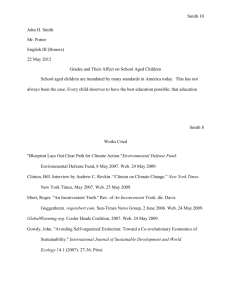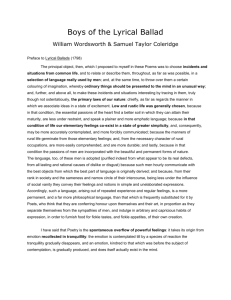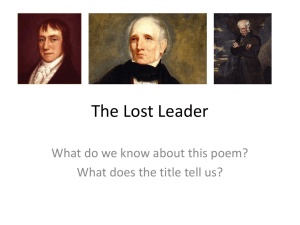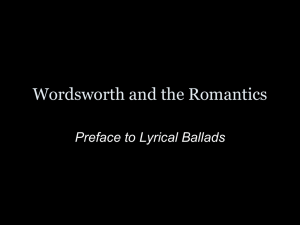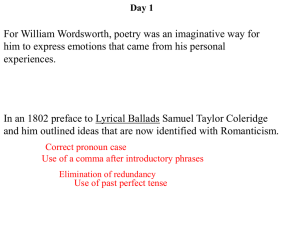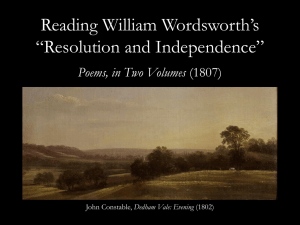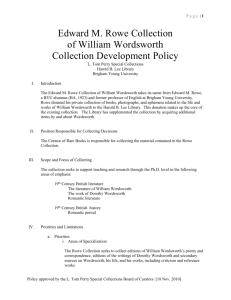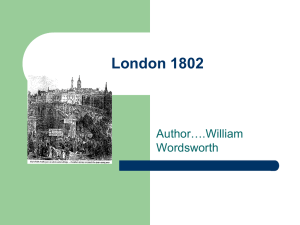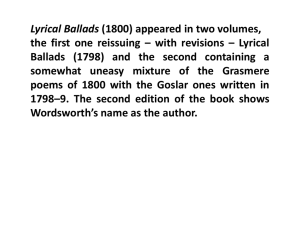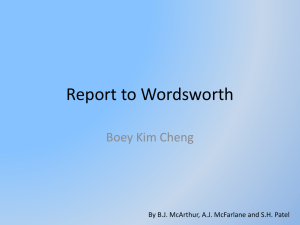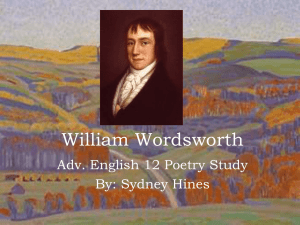Critical Approaches: Wordsworth
advertisement
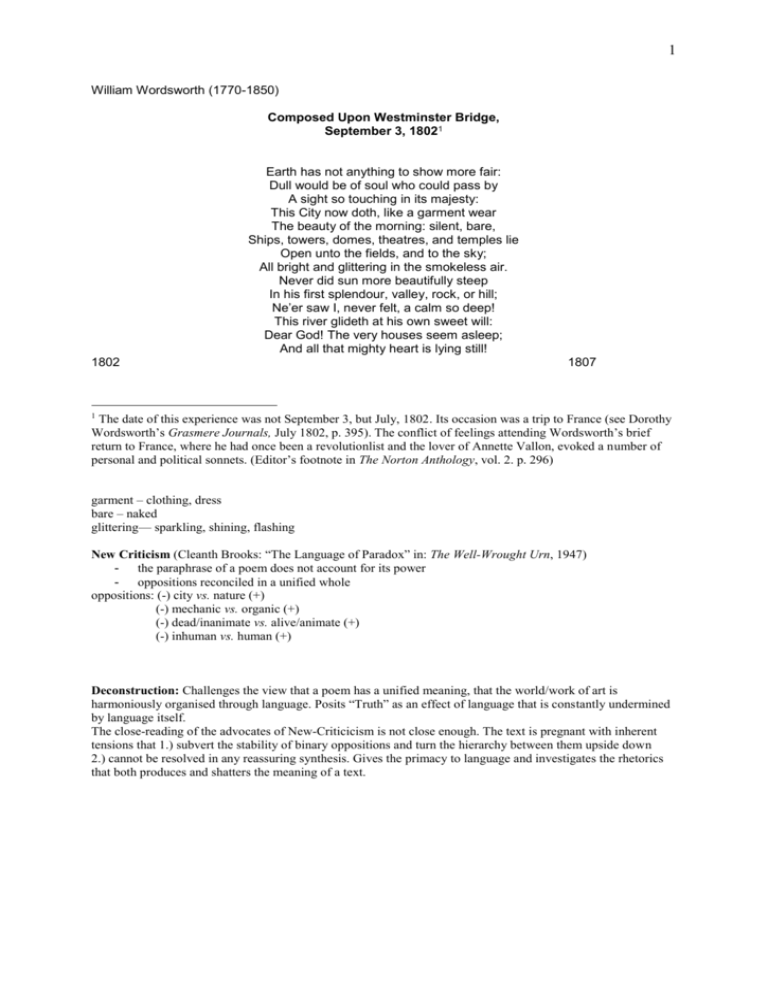
1 William Wordsworth (1770-1850) Composed Upon Westminster Bridge, September 3, 18021 Earth has not anything to show more fair: Dull would be of soul who could pass by A sight so touching in its majesty: This City now doth, like a garment wear The beauty of the morning: silent, bare, Ships, towers, domes, theatres, and temples lie Open unto the fields, and to the sky; All bright and glittering in the smokeless air. Never did sun more beautifully steep In his first splendour, valley, rock, or hill; Ne’er saw I, never felt, a calm so deep! This river glideth at his own sweet will: Dear God! The very houses seem asleep; And all that mighty heart is lying still! 1802 1807 1 The date of this experience was not September 3, but July, 1802. Its occasion was a trip to France (see Dorothy Wordsworth’s Grasmere Journals, July 1802, p. 395). The conflict of feelings attending Wordsworth’s brief return to France, where he had once been a revolutionlist and the lover of Annette Vallon, evoked a number of personal and political sonnets. (Editor’s footnote in The Norton Anthology, vol. 2. p. 296) garment – clothing, dress bare – naked glittering— sparkling, shining, flashing New Criticism (Cleanth Brooks: “The Language of Paradox” in: The Well-Wrought Urn, 1947) - the paraphrase of a poem does not account for its power - oppositions reconciled in a unified whole oppositions: (-) city vs. nature (+) (-) mechanic vs. organic (+) (-) dead/inanimate vs. alive/animate (+) (-) inhuman vs. human (+) Deconstruction: Challenges the view that a poem has a unified meaning, that the world/work of art is harmoniously organised through language. Posits “Truth” as an effect of language that is constantly undermined by language itself. The close-reading of the advocates of New-Criticicism is not close enough. The text is pregnant with inherent tensions that 1.) subvert the stability of binary oppositions and turn the hierarchy between them upside down 2.) cannot be resolved in any reassuring synthesis. Gives the primacy to language and investigates the rhetorics that both produces and shatters the meaning of a text. 2 “This City now doth, like a garment wear / The beauty of the morning…” body ---= garment City -----beauty of the morning What kind of body? Silent, bare, lying open to… (a corpse? a prostitute?) “The very houses seem asleep” (are they asleep?) oppositions shattered: dead vs. alive (aporia); material vs. spiritual meaning created and deconstructed by the text: city = nature; matter = spirit; inanimate = animate oppositions reconciled by the sheer power of tropes -- language (i.e. culture, as the very opposite of nature) – yet, language draws attention to itself and reveals its own arbitrary power to posit analogies New Historicism, Cultural Materialism Prime assumption: the text (work of art) cannot be separated from its context (history as created through discourses: texts). The work of art, or the aesthetic, does not transcend history but, even if it has ideological interests to create the illusion of transcendence, the most it can do is to erase the traces that witness its actual embeddedness in history. Criticise deconstruction on the basis of leaving the historical context out of consideration leaving the social and the political problems of a given era out of consideration. Strongly influenced by Marxism. New Historicism: emphasis on the ways in which texts contribute to and perpetuate the ideological assumptions of a given era. Cultural Materialism: concentrates on the ways in which texts undermine the ideological assumptions of a given era and offer places of resistance. Editor’s footnote: Ww. first goes to France at the height of his revolutionary enthusiasm, in 1792-94. Trip to France in 1802: wants to settle his affair with Annette Vallon, his ex-lover from whom he had a child. By 1802, Ww. has already turned into a conservative, planning to get married. He has vested interests in 1. erasing his affair with Annette Vallon 2. establishing his Englishness in anti-French England, and, therefore, to erase his youthful enthusiasm for the French Revolution. However, these historical circumstances leave their trace on the poem that is supposed to praise the English city. Ww describes his memories of the first trip (1792-94) in Books 9-10 of Prelude. “I crossed the Square (an empty Area then!) Of the Carousel, where so late had lain The Dead, upon the Dying heaped; and gazed On this and other Spots, as doth a Man Upon a Volume whose contents he knows Are memorable, but from him locked up, Being written in a tongue he cannot read […] High was my Room and lonely …. …………………………. I kept watch, Reading at intervals; the fear gone by Pressed on me almost like a fear to come. I thought of those September massacres, Divided from me by one little month. […] And in this way I wrought upon myself Until I seemed to hear a voice that cried To the whole City, “Sleep no more.” […] The place, all hushed and silent as it was, Appeared unfit for the repose of the Night, Defenceless as a wood where Tygers roam.” (Prelude: Book Tenth, France Continued , 71-93) Paris haunts the poem about London: What does it mean that the “houses seem asleep”? 3 New Criticism: seem asleep = they are living, gently human Deconstruction: seem asleep = can be dead or alive (but rather dead – cf: silent, bare body) Historical/Political readings: seem asleep = the working class masses only seem asleep, they will rise up and actually “murder sleep” (Macbeth). London = Paris Psychoanalytic reading With an emphasis on the notion of trauma, one can turn the political reading into a psychoanalytic reading. Wordsworth (Englishness) traumatised by the (missed encounter with the) French Revolution: the events were overwhelming, not understandable, shocking. The shock of these events cannot be assimilated, integrated. The trauma of history keeps returning and haunting any transcendental poetry of Englishness. Feminist readings Political agenda: emphasis on female voice, female writing, and on the construction of the female by male authors. Wishes to give (public) voice to the voiceless (the female) Would consider: 1. the relationship between Wordsworth’s rejection of Annette Vallon and the prostitute image of London (Paris). 2. the way in which Wordsworth both idealises and subjects the female body (London) 3. the role of Dorothy Wordsworth (Ww’s sister) and that of Dorothy’s journals in Wordsworth’s life and poetry. Dorothy’s voice is silenced, but, at the same time, used and abused by the male poet and by male poetry.
